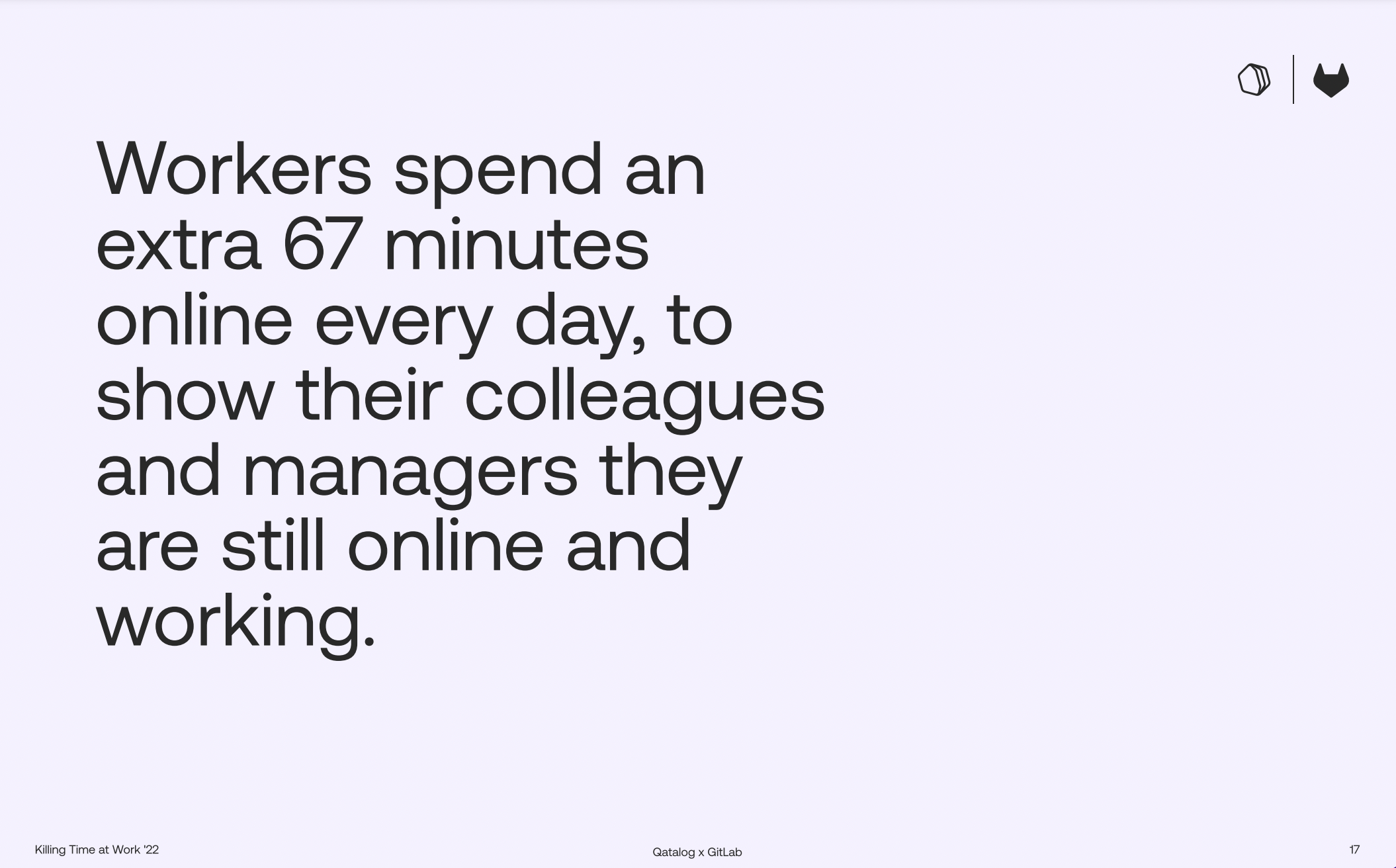In 2023, three years after the pandemic irrevocably shook up work culture, around 13% of workers in the U.S. are fully remote and 28% are hybrid. And while studies show that workers increasingly value and expect flexibility at a workplace and many companies offer flexibility — on paper, at least — there's instances where that doesn’t always translate to work reality.
Enter the concept of productivity paranoia. Like quiet quitting, rage applying, and RTO (aka “return to office” mandates), productivity paranoia has become a buzzword over the last few years. Think pieces and online horror stories about it abound. But what is it and how does it really affect hybrid and remote workers?
Below, let's take a moment to unpack what productivity paranoia is and how we can recast its role in our work and personal lives.
What really is productivity paranoia?
“Productivity paranoia” as a phrase was coined by Microsoft CEO Satya Nadella in 2022. According to Nadella, it happens when “leaders fear that lost productivity is due to employees not working, even though hours worked, number of meetings, and other activity metrics have increased.”
Microsoft’s research found that 85% of employers say that the work-from-home environment has made it more difficult to trust that their employees are actually getting their work done.
Microsoft’s research found that 85% of employers say that the work-from-home environment has made it more difficult to trust that their employees are actually getting their work done. In some cases, employers have even resorted to privacy-invading software (aka "bossware") that tracks their workers’ productivity to ensure they’re staying on task during work hours.
Well, are people working less?
No. In fact, according to some studies, many people are actually putting in more hours than they would if they were in an office. That includes beginning work earlier in the morning and staying online later in the evening, responding to calls, emails, and chats outside of work hours, and taking fewer breaks and sick days. According to a study conducted by Stanford University, working from home can increase an employee’s productivity by around 13%.
Put another way: 87% of employees say they are productive at home, but only 12% of employers believe it.
When Microsoft surveyed 20,000 hybrid and remote workers across 11 countries in late 2022, 87% reported that they were productive at work. Of course, this is self-reported, but technology backs them up. The number of meetings each week scheduled on Microsoft platforms has increased by 153% since the start of the pandemic. Plus, 42% of people are doing something else work related while sitting in on these meetings, Microsoft says.
Put another way: 87% of employees say they are productive at home, but only 12% of employers believe it.
If productivity paranoia has been disproven, why do people still believe it’s happening?
Major cultural changes—such as the complete workplace overhaul that’s happened over the last few years—inevitably come with growing pains. And humans are notoriously resistant to change, especially humans in power.
On top of that, lack of trust is one of the root causes of productivity paranoia and without face-to-face interaction, that trust is much harder to come by. That’s why despite the prevalence of remote work, 41% of executives say that remote workers are less likely to get promoted than in-office workers.
Why is productivity paranoia so bad?
According to research conducted by the business intelligence platform Qatalog and GitLab, 54% of knowledge workers (workers who spend the majority of their work day on their computers) feel pressure to prove they are online—moving their mouse, responding to emails and chats immediately, etc.—rather than actually getting work done.

This has also been given new terms called productivity theater or digital presenteeism, and can lead to major burnout. It also leads to people spending additional time online past their typical work hours (67 extra minutes a day, according to the Qatalog study), wasting valuable hours that could be spent on a personal project, social life, mental and physical health, or family. The lack of privacy and trust can also lead to resentment among many employees.
How to recast productivity paranoia as a remote or hybrid worker
At the end of the day, truly eradicating productivity paranoia within a workplace culture requires change from the top-down, but there are a few things hybrid and remote workers can do to assuage their employers’ fears—and therefore reduce the toxicity in their work environment.
1. Show your results—even when not asked for them
Productivity paranoia occurs when a manager is more focused on time spent working than on results. In order to combat that, show your employer what you are accomplishing every so often.
If they ask you to do a task, let them know when that task has been completed. Give status reports on long-term projects periodically. If you provide physical evidence that you are getting work done, your manager might be more inclined to ease off.
2. Set—and clearly communicate—boundaries
According to a 2021 study by Tiny Pulse, 80% of HR executives report that their hybrid workers are exhausted. That’s not good for anyone. One critical way to avoid burnout is to protect your work-life balance.
Use apps to make your life easier and more efficient. Set your work hours and stick to them. If you are firm with your boundaries and communicate them clearly, others will be more respectful of your time and efforts, too.
3. Make yourself known
Since face-to-face interaction builds trust, and building trust is the key component in eradicating productivity paranoia, remote and hybrid workers should do what they can to make themselves known to their employers. Brave the awkward silence and make meaningful small talk before everyone joins the Zoom meeting. Meet in person when necessary.
Share details about yourself and your work through conversations or on your Polywork website. The more your manager feels like they know you, the more likely they are to trust you are getting your work done.

